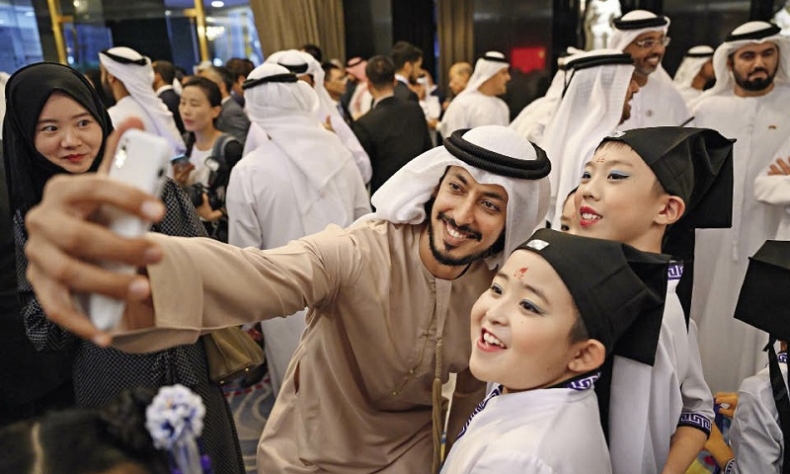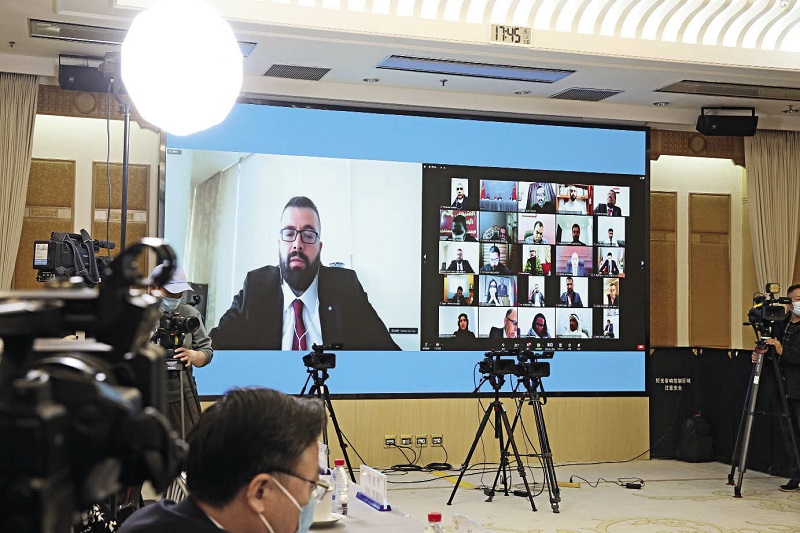Sources of Strength – Young Arab Leaders’ Observations on China’s Development

China has played an important role in maintaining international order and settling regional disputes.
As the Western media continues to peddle lies about forced labor involved in Xinjiang’s cotton production, a young leader from the Arab world told a different story about China. Adham Sayed, now a central committee member of the Lebanese Communist Party, chose to stay in China after the novel coronavirus outbreak in Wuhan as a doctoral student at Huazhong University of Science and Technology. “My classmates and I all feel our religious beliefs have been fully respected. In China, protection of people’s freedom of religious beliefs has been enshrined in the country’s constitution,” Sayed said at the China-Arab States Young Leaders Forum hosted by the International Department of the Central Committee of the Communist Party of China (CPC) via video link on March 30.
According to Sayed, although Wuhan is not home to a large Muslim population, Huazhong University of Science and Technology has four cafeterias offering food that meets the Muslim halal food standard. “From the outbreak to the total control of the pandemic, it only took China a few months to tackle. During the whole process, I personally witnessed China’s governance efficiency. The Chinese government treats all people equally. I have never seen any raciest behavior or experienced any racial discrimination here. Like anyone else in Wuhan, I got my first vaccine shot soon after it became available.”
At the opening ceremony of the forum, Minister of the International Department of the CPC Central Committee Song Tao said that the establishment of the China-Arab States Young Leaders Forum is an important measure to implement the consensus reached by the Chinese and Arab leaders, and will play a positive role in deepening China-Arab friendly cooperation and promoting the building of a China-Arab community with a shared future. Song then announced the official launch of the essay contest “The Communist Party of China in My Eyes” for the young people in Arab countries.
Leaders, young statesmen, and youth representatives of more than 60 political parties and political organizations from 17 Arab countries attended the opening ceremony.
Marking the centenary of the CPC, the year 2021 also saw China’s victory in eliminating extreme poverty. Attendees of the forum held in-depth discussions about such topics as China’s development experience, the key for the CPC to maintain its vitality, China’s role in international affairs, China’s diplomacy rooted in traditional Chinese culture, and building a community with a shared future for mankind.
Innovation, a Source of Vitality
“I think the theoretical innovation about the country’s development is one of the major reasons the CPC has maintained its vitality. The Belt and Road Initiative (BRI) is an excellent example of this,” said Ibrahim Nagy Elshehaby, a statesman from Egypt. According to Elshehaby’s understanding, by being very good at learning by trial and summing up its experiences, the CPC has led China on a unique development path and created a development model with Chinese characteristics.
Elshehaby maintains that China’s development has also highlighted the impact of its long history and culture, which actually constitute the foundation of its development and have also played a role in promoting the country’s economic development. “The BRI is both an economic initiative and a platform aimed to enhance people-to-people exchanges in countries along the routes, and improve people’s livelihood,” Elshehaby pointed out.
About the CPC’s theoretical innovation, Sayed from Lebanon elaborated on the CPC’s successive line of achievements in adapting Marxism to the Chinese context. “From Marxism-Leninism, Mao Zedong Thought, Deng Xiaoping Theory, the Theory of Three Represents, the Scientific Outlook on Development, to Xi Jinping Thought on Socialism with Chinese Characteristics for a New Era, the guiding theories of the CPC have been evolving and kept pace with the times,” said Sayed.
In addition, Sayed pointed out another reason for the CPC’s renewed vitality: stern and clear discipline as well as the sublime sense of mission regarding the role of its members. “What’s laudable is the consistency and continuity of China’s development policy despite the succession of state leaders. As all of China’s state leaders and the CPC members take it as their mission to seek happiness for the Chinese people and pursue the rejuvenation of the Chinese nation, Chinese people’s livelihood has also been improving,” Sayed said.
“While absorbing the essence of traditional Chinese culture, the CPC has been able to be self-reflecting and self-reforming, straightening up itself, rectifying its direction timely, and keeping pace with the times,” observed Samira Chaouachi, first vice-speaker of the House of People’s Representatives of Tunisia. Due to the extraordinary capacity for self-renewal, the CPC has led the country to achieve progress in fields across the board, and won plaudits and respect from more and more countries.
A commemorative event honoring the 35th anniversary of the establishment of diplomatic relations between China and the United Arab Emirates is held in Beijing on July 23, 2019. In the picture, an Arab participant is taking a selfie with Chinese young performers.

“People First,” Ensuring Popular and Effective Governance
Until now, when recalling his two-month-long lockdown life in Wuhan, Sayed still feels amazed at what he saw. Having witnessed the whole process of how Wuhan got the coronavirus outbreak under control, Sayed gained much insight into why and how the CPC works in China. He penned his experience in Wuhan during the special period in the book Confidence Comes from Effectiveness: A Foreigner’s Wuhan Diary.
“Speaking of China’s efficiency in bringing the COVID-19 epidemic under control, it reminds me of the saying the CPC and the Chinese government often emphasize, ‘We must put the health of the people first,’” said Sayed. He thinks that this is in sharp contrast to some countries’ practice in dealing with the crisis: to seek economic gains while ignoring people’s health.
“After Wuhan declared a lockdown of the city on January 22, the next day onward saw all residents voluntarily quarantine at home. That was unbelievable, and also let me understand the trust between the government and the public. The people had full faith in their government’s capacity to finally defeat the epidemic; and the government also trusted people in efficiently implementing prevention measures,” said Sayed.
At first, some inconveniences and difficulties did occur in people’s daily life, he recalled. “The local CPC organizations and government gave us much help, which reassured us. In particular, when we saw so many volunteers from across the country arrive in Wuhan, we believed that China was bound to defeat the pandemic,” said Sayed. He thinks that the success is not just of Wuhan and China, but of the whole world. “This is very valuable experience in defeating the crisis posed by the epidemic,” Sayed pointed out.
Sayed’s experience brought him to the conclusion: the CPC’s “people first” governance concept is one of the major reasons the Party is able to keep its vitality. “It makes the CPC very popular, widely supported by the people, and very cohesive,” Sayed observed.
Elshehaby did not think China’s feat in quickly and effectively putting the COVID-19 epidemic under control unexpected as the high unity and concord among the CPC, the government, and the people ensured quick success. This is what the world should learn from China in Elshehaby’s opinion.
In the view of Mohsen Basurra, member of Yemeni Islah Party and deputy speaker of the House of Representatives of Yemen, the CPC is the only political party that can unite people from all walks of life in China. “This is very important for us to learn. It’s exactly because of the CPC’s strong cohesiveness and policy guidance that China has made such amazing achievements. We’re very keen to learn from China’s development experience,” he said.
For an Equitable, Balanced, and Inclusive World
“The people of the Arab world hope that China plays an important role in promoting a more balanced world. I think the Belt and Road Initiative is providing an excellent platform for related countries to realize balanced and common development,” Basurra observed.
In Sayed’s opinion, the popularity of the BRI among so many countries can be ascribed to the mutually beneficial nature of the initiative. In his eyes, with exchanges and cooperation with China, Arabic countries have acquired new concepts about international relations. “They realized that relations between countries can be developed in such a mutually beneficial way,” he said.
Mohsen Basurra applauded China’s role in international exchanges. China has been friendly and modest in its exchanges with other developing countries while sticking to its principle of non-interference in other countries’ internal affairs, and shared its development experience, he said. “China has unreservedly shared its anti-epidemic experience with other countries, and extended aid to many countries, but never made a big deal out of it. China’s dedication to what it advocates and believes in as well as the common development of the whole world without tooting its own horn is exactly what the world needs now,” Basurah said. He believes that China is an important force for justice and has won respect of many countries for supporting the development of developing countries.
Terrorism has been a major hurdle in the quest for peace and development of Arabic countries. Elshehaby thinks China’s way to defeat terrorism, such as eliminating poverty by boosting local development, is commendable. “China has played an important role in maintaining international order and settling regional disputes. We hope China will go further to advance the building of an equitable, stable, and balanced world, thus vanquishing terrorism,” Elshehaby said.
In Sayed’s view, China’s approach to dealing with international issues has brought the world a new perspective. “In handling the terrorism issue, China’s way is to pinpoint its root causes: unemployment, ignorance, and social division. China seeks to create more jobs and promote social development, thus eliminating the seeds of the generation of terrorism,” Sayed pointed out.
The young Arab leaders attending the forum all agree that with cooperation with China, their countries’ development has been boosted. They think only if their countries can gain balanced development and provide young people more development opportunities, can terrorism be rooted out. They expressed their hope that China would play a bigger role in international affairs and continue to contribute to global peace and stability.
 Facebook
Facebook
 Twitter
Twitter
 Linkedin
Linkedin
 Google +
Google +










